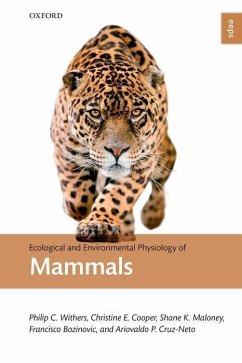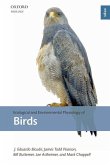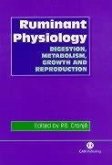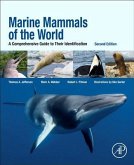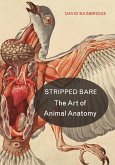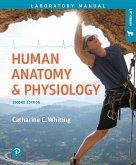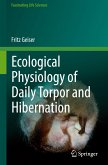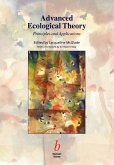Philip C Withers, Christine E Cooper, Shane K Maloney
Ecological and Environmental Physiology of Mammals
Philip C Withers, Christine E Cooper, Shane K Maloney
Ecological and Environmental Physiology of Mammals
- Gebundenes Buch
- Merkliste
- Auf die Merkliste
- Bewerten Bewerten
- Teilen
- Produkt teilen
- Produkterinnerung
- Produkterinnerung
This book summarizes our current knowledge of the complex and sophisticated physiological models that mammals provide for survival in a wide variety of ecological and environmental contexts: terrestrial, aerial, and aquatic.
Andere Kunden interessierten sich auch für
![Ecological and Environmental Physiology of Birds Ecological and Environmental Physiology of Birds]() J Eduardo P W BicudoEcological and Environmental Physiology of Birds200,99 €
J Eduardo P W BicudoEcological and Environmental Physiology of Birds200,99 €![Ruminant Physiology Ruminant Physiology]() Pierre CronjeRuminant Physiology421,99 €
Pierre CronjeRuminant Physiology421,99 €![Marine Mammals of the World Marine Mammals of the World]() Marc A. WebberMarine Mammals of the World100,99 €
Marc A. WebberMarine Mammals of the World100,99 €![Stripped Bare Stripped Bare]() David BainbridgeStripped Bare27,99 €
David BainbridgeStripped Bare27,99 €![Human Anatomy & Physiology Laboratory Manual Human Anatomy & Physiology Laboratory Manual]() Catharine WhitingHuman Anatomy & Physiology Laboratory Manual134,99 €
Catharine WhitingHuman Anatomy & Physiology Laboratory Manual134,99 €![Ecological Physiology of Daily Torpor and Hibernation Ecological Physiology of Daily Torpor and Hibernation]() Fritz GeiserEcological Physiology of Daily Torpor and Hibernation66,99 €
Fritz GeiserEcological Physiology of Daily Torpor and Hibernation66,99 €![Advanced Ecological Theory Advanced Ecological Theory]() Advanced Ecological Theory176,99 €
Advanced Ecological Theory176,99 €-
-
-
This book summarizes our current knowledge of the complex and sophisticated physiological models that mammals provide for survival in a wide variety of ecological and environmental contexts: terrestrial, aerial, and aquatic.
Hinweis: Dieser Artikel kann nur an eine deutsche Lieferadresse ausgeliefert werden.
Hinweis: Dieser Artikel kann nur an eine deutsche Lieferadresse ausgeliefert werden.
Produktdetails
- Produktdetails
- Verlag: Oxford University Press (UK)
- Seitenzahl: 608
- Erscheinungstermin: 15. November 2016
- Englisch
- Abmessung: 249mm x 175mm x 33mm
- Gewicht: 1247g
- ISBN-13: 9780199642717
- ISBN-10: 0199642710
- Artikelnr.: 47870295
- Herstellerkennzeichnung
- Produktsicherheitsverantwortliche/r
- Europaallee 1
- 36244 Bad Hersfeld
- gpsr@libri.de
- Verlag: Oxford University Press (UK)
- Seitenzahl: 608
- Erscheinungstermin: 15. November 2016
- Englisch
- Abmessung: 249mm x 175mm x 33mm
- Gewicht: 1247g
- ISBN-13: 9780199642717
- ISBN-10: 0199642710
- Artikelnr.: 47870295
- Herstellerkennzeichnung
- Produktsicherheitsverantwortliche/r
- Europaallee 1
- 36244 Bad Hersfeld
- gpsr@libri.de
Philip Withers completed his PhD in biology at the University of California at Los Angeles, in 1976, on fossorial and heterothermic mammals and birds. He then visited The University of Cape Town as a Postdoctoral Fellow, studying thermoregulation, energetics and water balance of desert vertebrates. He has subsequently held academic positions at Portland State University and currently the University of Western Australia. His major research area is comparative animal physiology, with a focus on the metabolic, thermal, respiratory, hygric and solute physiology of terrestrial vertebrates. His research melds laboratory and field studies to examine the mechanistic basis of physiological processes in an environmental context for wild, free-living animals. Christine Cooper completed her PhD in zoology at the University of Western Australia, studying numbat physiology and behaviour. She then spent a year as a Postdoctoral Fellow at the University of New England, studying thermoregulatory physiology. Since 2005 she has been a research and teaching academic at Curtin University in Perth, Western Australia. Her major research area is environmental physiology, with a focus on the metabolic, hygric and thermal physiology of mammals and birds. Dr Cooper combines laboratory and field techniques to examine the mechanistic basis of physiological processes, and applies these to wild, free-living animals. Her work addresses basic scientific questions of environmental adaptation and evolution by applying physiological techniques to examine behavioural and ecological responses to environmental conditions and life history variables. Her work also directly contributes to improved species conservation and environmental management. Shane Maloney did his PhD on emu thermal biology at the University of New South Wales. He then did a post-doc with Duncan Mitchell in South Africa, focussing on brain and scrotal temperature regulation in mammals. Since 1999 he has been at the University of Western Australia. His predominant research field is thermal physiology, including work on production animals and humans. He is interested in physiological responses to the environment in general. Francisco Bozinovic is drawn to integrative animal biology by a fascination and curiosity-based drive to understand how animals work, behave and evolve. Specifically, his research interests cover a broad range of topics in integrative animal biology, but he is mostly engaged in ecological physiology with strong ties into behavioral ecology, evolutionary ecology and biogeography. Ariovaldo P. Cruz-Neto is author of over 50 publications on the physiology and ecology of a wide group of vertebrates, particularly mammals, with an extensive experience with bats. He has research experience on metabolic physiology, especially with topics concerning the proximate and ultimate factors responsible for patterns of energy expenditure in mammals.
1: Introduction to Mammals
2: General Physiological Principles
3: Physiological Characteristics of Mammals
4: Physiological Adaptations to Extreme Environments
5: Concepts/Approaches/Techniques/Applications
6: Conclusions and Future Directions
2: General Physiological Principles
3: Physiological Characteristics of Mammals
4: Physiological Adaptations to Extreme Environments
5: Concepts/Approaches/Techniques/Applications
6: Conclusions and Future Directions
1: Introduction to Mammals
2: General Physiological Principles
3: Physiological Characteristics of Mammals
4: Physiological Adaptations to Extreme Environments
5: Concepts/Approaches/Techniques/Applications
6: Conclusions and Future Directions
2: General Physiological Principles
3: Physiological Characteristics of Mammals
4: Physiological Adaptations to Extreme Environments
5: Concepts/Approaches/Techniques/Applications
6: Conclusions and Future Directions

